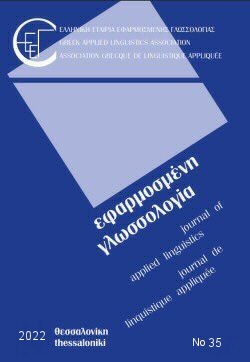Eleni Agathopoulou
Editor’s Preface
Lia Efstathiadi, Marina Mattheoudakis
Early immersion effects on cognition: Evidence from a US charter school teaching L2 Greek
The present study investigates the degree to which length of L2 experience and intensity of L2 exposure may affect young learners’ executive function system at the very early stages of foreign language instruction. More specifically, we tested the effect of increased exposure to L2 Greek on young learners’ updating, inhibition and executive attention. The study took place in a US charter school which offers foreign language instruction with Greek as L2 in two different types of programs: FLES (Foreign Languages in Elementary Schools) and Immersion. Fifty-six 6- and 7-year-old students were tested: twenty-six students in grade 1 (thirteen students/group) and thirty students in grade 2 (fifteen students/group). Based on our results, both groups displayed cognitive gains of a different degree, with the immersion groups displaying more prominent cognitive gains than the FLES groups. The study contributes to research in the cognitive impact of intensive foreign language education on young learners by examining a pair of languages (L1 English, L2 Greek) that, to our knowledge at least, has never before been researched in the US educational context.
Georgia Fotiadou, Alexandra Prentza, Christina Maligkoudi, Stamatia Michalopoulou, Marina Mattheoudakis
Investigating teacher beliefs, attitudes and practices regarding the inclusion of refugee and immigrant students in Greek state school
This paper presents data on the beliefs, attitudes, and reported practices of state school teachers concerning the education of immigrant/refugee children. Teachers’ beliefs are generally considered to exert an important influence on their professional practices, while relevant findings in recent research appear contradictory. The 56 informants participated in online seminars organized by the information service “Me 2 Glosses” and the Prefectural Directorate of Education of Epirus in 2020–2021. Upon completion of the seminars, an online questionnaire was administered which included questions on the use and maintenance of heritage languages, bilingual profile, academic differences between monolingual and bilingual students and teaching practices supporting bilingualism. Teachers’ answers indicate that their efforts to support immigrant/refugee students focus on the development of their linguistic skills in Greek. However, the results also indicate a lack of awareness regarding the importance of acknowledging those students’ heritage language and culture; such practices would be clear indicators of teachers’ accepting their students’ diversity.
Joylynn Chew Yen Lim, Yan Hoong
Adapting the FAMILY framework to the teaching and learning of multimodal literacy at the primary level
The affordances brought about by digital media and technology have changed the way we now read and view texts. Literacy has moved beyond its traditional sense of alphabetic literacy to reading and viewing texts with more than one semiotic mode. In response to this changing way of how texts are presented and viewed, multiliteracies is one of the pedagogical emphases in the 2020 EL Syllabus. This study attempts to find out if the intentional teaching of the aspects in the FAMILY framework (Lim & Tan, 2017) will allow pupils to make informed and coherent interpretations of a poster. An adapted model of the FAMILY framework will subsequently be proposed to better suit the learning needs of primary school students.
Christina Maligkoudi, Anna Dedopoulou, Vassiliki Milioti
Examining Indian students’ bilingual profiles in Greece
This study investigates the bilingual profiles of Indian students in the Greek context. Indian students comprise a minority group that is highly underexamined in the Greek literature, in contrast to other minority groups in Greece (e.g., Albanians, see Chatzidaki & Maligkoudi, 2013; Mattheoudakis et al., 2020). In particular, this article examines the bilingual profiles and the language behavior of sixteen (16) Indian students in the Greek educational context, namely in two schools in Attica. Content analysis of their interviews was applied, with the aim of exploring their bilingual profiles, their patterns of language choice and use as well as their attitude towards their home languages. Our findings reveal that the main language of communication adopted in the school environment (outside and inside the classroom) is Greek. On the other hand, Hindi or Punjabi are mostly used in the home environment, mainly due to the fact that mothers have a low proficiency in Greek. The results of our study also highlight how our participants perceive the role of host classes in their integration into the educational process.
Lydia Mitits, Zoe Gavriilidou
Predictors of language learning strategy promotion by teachers in dual-immersion schools
This paper reports on results of a quantitative study investigating Language Learning Strategies (LLS) that teachers of Greek L2/Turkish L1 in dual-immersion primary schools promote as well as the possible effect of gender, teaching experience and education level on their LLS promotion. The particular schools are separate schools for bilingual children (L1 Turkish/L2 Greek) in Thrace, Greece. Their societal and educational aims are language maintenance, pluralism and enrichment whereas the linguistic aim is bilingualism and biliteracy. However, the students’ Greek language proficiency and their general academic achievement are low. The study was conducted as part of in-service teacher training aiming to provide teachers with teaching methodology on LLS. It examines 102 self-evaluations of the strategies L1 and L2 teachers promote in class. Our findings show that the teachers reported high frequency of strategy promotion. There were significant differences on individual strategies between L1 and L2 teachers. Lastly, gender, teaching experience, and education level appeared to be predictors of LLS promotion.

